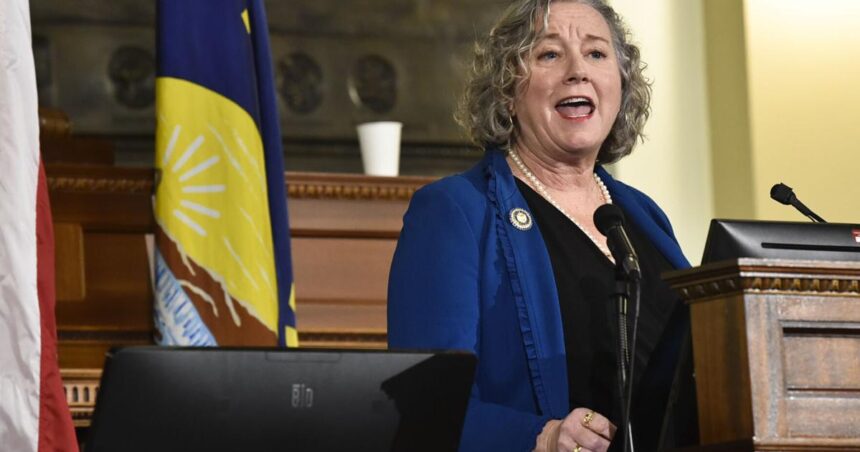Shannon O’Brien puts one elbow on the table and cradles her chin in her hand. Wearing thick circular glasses frames in a subtle pattern, she listens intently with steady eye contact when someone speaks. A state senator now running to lead Montana’s education agency, O’Brien dons a green name tag in the shape of a shamrock — an homage to her Irish roots — on her sweater. She stashes campaign business cards publicizing her personal cellphone number in her purse.
“If I want to get elected to office, I have to be OK with people reaching me,” she said.
On a Thursday afternoon in Missoula, she’s invited a small group of public school teachers to a local coffee shop to share their thoughts over morning glory muffins and pesto puff pastries. She asks them all two questions: “What would you want me to know?” and “If you had a magic wand, how would you change public education?”
People are also reading…
Moments like these offer a glimpse into what O’Brien says sets her apart in the race to lead the Office of Public Instruction — a “happy warrior” advocating for public education.
She believes her experience as a state senator, education policy advisor under Gov. Steve Bullock and a slew of administrative roles including the Dean of Missoula College will allow her to bridge what feels, in her eyes, like an ever-growing gap between legislators and educators.
“The superintendent’s primary role is to advocate for public education and to support teachers and school personnel in fulfilling their need to help every single child reach their potential,” O’Brien, a Democrat from Missoula, said. “I will be helping legislators understand what’s really going on in the classroom. And that’s part of why I’m going around the state and hearing directly from teachers.”
O’Brien is running uncontested in the Democratic primary for OPI superintendent. She will face the Republican primary winner, Susie Hedalen of Townsend or Sharyl Allen of Harrison, in the general election. It’s the only statewide contest without an incumbent. Elsie Arntzen, current officeholder, will term out at the end of this year. She’s running to represent the second congressional district in eastern Montana.
Not enough teachers at the table
The state senator started her career as an elementary teacher in Washington before shifting her focus to education policy and administration. Those early classroom years undergird her public education ethos.
O’Brien vividly recalls a memory from one of the many long days during her first year as a teacher. Her classroom, a cramped space where kids used foldable desk-chair combos, had no flat surface to grade papers. She couldn’t display any of the books she had purchased to get students excited about reading. The young teacher was dog-tired and working overtime as the school’s ski club manager and a coach.
“I couldn’t complain because the other first-year teachers just had carts,” she says while chuckling.
The way O’Brien tells the story now, a few decades later, it was the quintessential lightbulb moment. She realized it wasn’t the school district or the school board that was responsible for the way things were, it was the state Legislature.
“If they knew what it was really like, there would be more here,” O’Brien said.
Even as she’s swapped the classroom for the Capitol, O’Brien takes pride in her identity as an educator. She uses words like “we” when speaking with teachers, and often references the ways that her early training influences her current work. During the 2023 legislative session, O’Brien sponsored five bills touching education and served on the Senate Education and Cultural Resources Committee.
Central to her campaign for OPI superintendent is the same belief she formed as a struggling twenty-something without a bookshelf in her classroom — that if decision-makers knew what teachers face, they would craft policies to better support them.
“The whole reason I got into this business is because there aren’t enough teachers making decisions,” O’Brien said.
‘Fire in my belly’
So, what is this business exactly?
The next state superintendent will be tasked with managing the roughly $1.2 billion in taxpayer dollars allocated by the Legislature plus federal grants and other funding streams. OPI oversees Montana’s 400 public school districts and 148,500 K-12 students. The agency is charged with ensuring Montana lives up to its constitutional guarantee to a free, quality education for all.
Local school boards exercise the heaviest influence over a district’s day-to-day operations. But OPI implements education policy passed by the Legislature, ensures compliance with the law and monitors student success. OPI’s head provides regular updates to key partners and oversees technical assistance to school districts in areas like Indian Education for All, special education and school finance.
The OPI superintendent also serves as a member on the Land Board and the State Library Commission and a non-voting member on the Board of Regents and the Board of Public Education.
Under Arntzen, OPI has experienced high turnover of longtime staff. School administrators report feeling unsupported by the agency and say they have struggled to get accurate information — or even callbacks — from OPI. The agency has been the subject of extensive questioning from multiple legislative interim committees, including the Education Interim Committee of which O’Brien is a member. Its fractured relationship with the Board of Public Education culminated in a lawsuit against OPI.
“Certainly, we can do better for our teachers and our families and our communities,” O’Brien said. “I’m watching the past eight years of what’s been going on in this office, and it’s heartbreaking and it’s very frustrating. So that’s really the primary reason and the fire in the belly for me running.”
O’Brien on the issues
If elected, O’Brien says job No. 1 will be rebuilding the agency and uplifting the people who have been fighting for public education despite the challenging environment. That includes OPI staff and partners such as BPE and school districts.
“There’s a culture of trust that needs to be reestablished,” she said. “That means showing up and learning what the barriers are.”
She points to her list of endorsements, including state lawmakers, mostly Democrats and three former OPI superintendents, as proof she knows how to do that from her first day in office.
The 2023 Legislature of which O’Brien was a part introduced 125 bills related to education, according to a count by the Flathead Beacon, more than any session in at least the decade prior. Many of those that passed rattled the foundation of public education, things like education savings accounts and dueling charter school bills. Others demonstrated how even Montana with its libertarian streak had fallen in line with the national trend of making education an ideological flashpoint. There was talk of book bans and efforts to limit trans students’ participation in women’s sports.
All the while, the state has struggled to fill teacher vacancies and school budgets are crumbling. Students are reporting higher-than-ever rates of mental illness and less than half of third-graders have grade-level reading proficiency.
As a member of the Legislature, O’Brien could craft policy to tackle these issues. As OPI superintendent, she will have to implement the laws that her former colleagues pass.
When asked about this transition, O’Brien said she’s only one of 150 legislators. As superintendent, she could be the sole person whose primary job is to advocate for public education.
“I’ll say that I did not witness strong advocacy for public education in the last seven years,” she said. “If the superintendent is not supporting public education, what are they doing?”
O’Brien casts herself as a stark departure from the current administration at OPI.
She wants to protect against the “privatization of public education,” referring to initiatives such as education savings accounts and community choice charters that use taxpayer dollars to fund options outside the system.
Teacher recruitment and kindergarten readiness are integral to her platform, though her ability to directly create change in these areas as superintendent are limited. That’s where using the office’s platform for advocacy comes into play, O’Brien says.
O’Brien would testify at the Legislature and work with partners to call for a greater share of the state’s general fund to go toward public education so schools have the money they need to succeed. She’d try to collaborate on creative solutions to systemic barriers to teacher recruitment such as housing, starting pay and even the cost of higher education.
“We’re not putting our money where our mouth is,” she says.
OPI doesn’t set accreditation or licensure standards — that responsibility lies with the BPE — but the state superintendent’s opinion on what’s best for students and teachers carries weight. O’Brien doesn’t support lowering standards for teacher licensure, though she acknowledges there’s likely room to adapt standards to better serve the modern-day teacher, many of whom are doing more with less.
“These aren’t glorified babysitters,” O’Brien said. They are professionals who provide valuable skills and knowledge but are also instrumental in social and emotional learning, helping kids with their home lives and addressing their needs outside the classroom, she continued.
As for making sure more Montanans are clearing developmental milestones before they enter kindergarten, O’Brien supports fully funded preschool for every child in the state. That does not mean mandatory preschool attendance — a misunderstanding she hears often on the campaign trail — but the opportunity to attend these pre-K programs would be available to all.
O’Brien said the term “parents’ rights” concerns her, because she thinks it’s meant to mask more nefarious efforts to control what students are learning. Parent to a high-schooler herself, O’Brien is honest that there are certain things she wouldn’t want her son being exposed to in school, but she trusts the professionals who do their jobs and the systems in place to engage parents.
“I strongly believe there are very few people that have perceptions of our public schools that are woefully inaccurate,” O’Brien said. “They’re being very loud, and they’re scaring people. And they’re doing serious damage to our children, our teachers and the teaching profession.”
Primary elections take place June 4. Early voting has begun, and mail-in ballots have already been issued. They must be received by elections offices no later than Election Day; postmarks do not count. Montanans can still register to vote and information is available at https://votemt.gov.
O’Brien is running uncontested in the Democratic primary. There are two candidates in the Republican primary: Susie Hedalen of Townsend and Sharyl Allen of Harrison. The State News Bureau’s profile of this race can be found here.
Carly Graf is the State Bureau healthcare reporter for Lee Montana.





